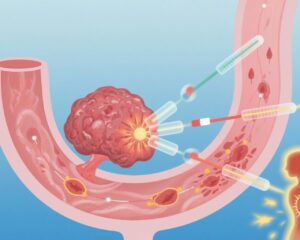Highlight
– Statin exposure correlates with significantly longer overall survival (OS) in patients with advanced prostate cancer treated with apalutamide.
– No survival benefit was observed with statin use in patients receiving placebo.
– Statin-exposed patients had increased risk of grade 3 or higher cardiac adverse events (AEs), likely reflecting preexisting cardiovascular disease.
– These findings come from a comprehensive cohort analysis of two large phase 3 randomized trials, TITAN and SPARTAN.
Study Background and Disease Burden
Prostate cancer remains a leading cause of cancer mortality worldwide, with advanced stages posing substantial therapeutic challenges. Apalutamide, an androgen receptor inhibitor, has transformed the treatment landscape for metastatic hormone-sensitive and nonmetastatic castration-resistant prostate cancer. However, optimizing overall survival with this intensified therapy necessitates understanding potential modifiers such as concomitant medications.
Statins, widely prescribed cholesterol-lowering agents, have demonstrated anti-tumor and immune-modulatory effects in preclinical studies, sparking interest in their possible role in prostate cancer management. Despite observational data suggesting favorable outcomes with statins, there is incomplete clarity on their impact when paired with potent androgen receptor targeting agents like apalutamide.
Study Design
This cohort study leveraged individual patient data pooled from the multicenter, phase 3 randomized clinical trials: SPARTAN (October 14, 2013, to December 15, 2016) and TITAN (December 15, 2015, to July 25, 2017). These trials respectively enrolled patients with nonmetastatic castration-resistant prostate cancer and metastatic hormone-sensitive prostate cancer, randomizing them to receive androgen deprivation therapy with either apalutamide or placebo.
Statin exposure was tracked during the assigned treatment period, including statin use prior to and after the study therapy. The analysis assessed overall survival (OS) as the primary endpoint and graded cardiac adverse events (grade 3 or higher) as secondary safety outcomes.
The statistical approach included inverse probability of treatment-weighted (IPTW) Cox proportional hazards models for OS estimation, adjusting for relevant covariates. Fine and Gray competing risk regression models evaluated associations of statin exposure with serious cardiac AEs, accounting for death as a competing event.
Key Findings
The analysis included 2,187 patients: 1,288 received apalutamide (517 in TITAN and 770 in SPARTAN) and 900 received placebo. Median age was 65 years (IQR 60-70) in TITAN and 70 years (IQR 65-80) in SPARTAN. Patients on statins were generally older and had higher body mass index, with a slightly lower proportion having ECOG performance status 1.
Notably, statin exposure was significantly associated with improved OS in apalutamide-treated patients. In TITAN, the hazard ratio (HR) for death was 0.53 (95% CI, 0.32-0.87); in SPARTAN, HR was 0.54 (95% CI, 0.39-0.74). Conversely, no significant OS benefit was observed with statins in placebo-treated patients.
Three-year covariate-adjusted OS for patients receiving apalutamide was 81% with statins versus 67% without in TITAN (difference 14%, 95% CI 5%-22%), and 86% versus 78% in SPARTAN (difference 8%, 95% CI 3%-13%). These substantial survival differences highlight a potentially synergistic benefit of statins with apalutamide therapy.
However, statin use was also linked to increased risk of severe cardiac AEs (grade ≥3). In the apalutamide group, the subdistribution hazard ratio was 2.62 (95% CI, 1.35-5.08), and in the placebo group, 2.36 (95% CI, 0.96-5.84). This elevated cardiac risk likely reflects the higher baseline cardiovascular comorbidity prevalent in statin users.
Expert Commentary
This study offers valuable evidence supporting the combined use of statins with intensified androgen receptor inhibition in advanced prostate cancer, demonstrating pronounced survival benefits. The findings are biologically plausible given statins’ ability to inhibit cholesterol synthesis integral to androgen biosynthesis pathways and their known anti-inflammatory effects.
Nevertheless, the increased incidence of severe cardiac events underscores the need for vigilant cardiovascular risk assessment and management in this population. Statin users are often burdened with preexisting cardiovascular disease, which may predispose to cardiac complications during cancer treatment.
Limitations include the observational nature of statin exposure within randomized trials and potential residual confounding. Future prospective studies are warranted to confirm causal relationships and explore optimal cardiovascular monitoring strategies tailored to this high-risk group.
Conclusion
The combined analysis of the TITAN and SPARTAN trials reveals that statin exposure is associated with significantly prolonged overall survival in patients receiving apalutamide for advanced prostate cancer. This promising finding supports considering statin therapy as a modifiable adjunct in this setting. However, clinicians must balance benefits against the increased risks of serious cardiac adverse events, necessitating comprehensive cardiovascular evaluation and close surveillance.
Further research should confirm these observations and elucidate mechanisms, aiming to optimize therapeutic regimens that improve longevity while safeguarding cardiac health in men with advanced prostate cancer.
References
Roy S, Ozay ZI, Guha A, et al. Statin Use in Patients With Advanced Prostate Cancer in the TITAN and SPARTAN Trials. JAMA Netw Open. 2025;8(8):e2527988. doi:10.1001/jamanetworkopen.2025.27988


